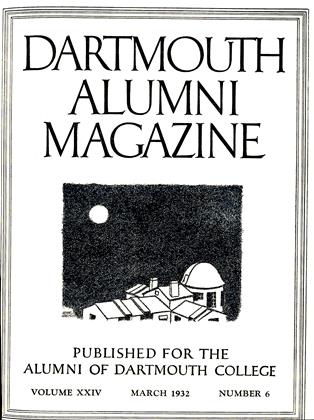. By Ben Ames Williams '10. New York: E. P. Dutton, 1932. 470 pages.
"Too-oo Late! I thought that love would always wait." There is, at the moment, much on the air and much favored by the crooners, a popular song which begins that way. It wouldn't be an inappropriate theme song for Honeyjlow, which ends that way. From up Fraternity-way, down-east in Maine, Mr. Williams this time brings Sophie Randle, who rises undeviatingly, from an orphan home on the rockbound coast to the spotlight of The Metropolitan. Once Sophie has made up her mind to become a world-famous prima donna, she abandons every other motive. Endowed with more than her share of voice, physical attraction, and acumen, she lets nothing get in the way of her career. Behind her she leaves a wake of destruction and heartache, through which she strides quite unperturbed until—. Until, perhaps her success when finally attained isn't unmixed with wormwood. Like most queen bees, she finally (belatedly) came to realize that what she really wa-a-a-nted all the time, was not glory, but love. And like one of Balzac's more pitn ful characters, she discovers that she has been given hard candy to eat when her teeth are gone.
Sophie is the book. She buzzes, busily acquisitive of fame, wealth, and temporary protectors, through seven symbolic chapters entitled: APRIL,—Red Maple; MAY—SweetLocust; JUNE—Apple Blossoms; JULYElderberry Blow; AUGUST—Sweet Clover; SEPTEMBER—Goldenrod; OCTOBER—Aster; well, you get the idea!
Actually, you somehow can't feel sorry for the sobbing Sophie on whom the book gently closes. After having watched her spill so much ruthless misery on completely undeserving innocents who get in her way; Mr. (and especially) Mrs. Average Reader can scarcely be blamed for feeling both good and glad when Alec finally takes the train to the City away from Sophie forever.
Scene of real tragedy is Gretchen's (one of the innocents) discovery that for years she has been worshipping a snowman. Most powerful chapter: Sophie's opening at the Metropolitan in Lilith, an opera written especially for her. Best character in this entertaining but never quite exciting study in genius: Papa Schachter, Sophie's irascible and inspiring maestro, who made her articulate but could not make her human.
The issue of Publishers Weekly for December 12, 1931 contains an article by Joseph Brewer '20 "Some Visionary Meditations on Publishing."
The Boston Evening Transcript for December 19, 1931 contains an article by Charles M. Dudley '29 entitled "Our Modern Skiing has Ancient Origins." The February 13, 1932 issue of the same paper contains another article by Mr. Dudley entitled " 'Brass Tacks' of Clothing for the Skier."
The December Harpers Magazine contains an article "How Efficient are the Russians" by Walter Polakov, in collaboration with Carl T. Swanson '27.
Recent books by John Hanna '14, Professor of Law at Columbia University, are: "The Law of Cooperative Marketing Associations" published by the Ronald Press, New York, and "Cases and Material on the Law of Creditor's Rights" published by the Commerce Clearing House, Inc., New York.
E. Francis Brown '25 is the author of an article in the January issue of Current History "Mr. Hoover Faces Nations Problems."
"Pendrift" by Charles E. Crane '06, published by the Stephen Daye Press, will be reviewed in a later issue of the magazine.
Reverend Boynton Merrill 'l5 is the author of "From Confession to Certainty." This book will be reviewed later.
An interesting book relating to a Dartmouth graduate of the class of 1830 is "John Humphrey Noyes, the Putney Community" compiled and edited by George Wallingford Noyes, published at Oneida, New York, in 1931.
The January number of Creative Art con- tains an article "Ralph Steiner" by Dr. M. F. Agha. This article relating to Steiner of the class of 1921 is illustrated with some of his excellent photographs.
 View Full Issue
View Full Issue
More From This Issue
-
 Article
ArticleFrom War to Depression
March 1932 By Bruce Winton Knight -
 Lettter from the Editor
Lettter from the EditorEditorial Comment
March 1932 -
 Lettter from the Editor
Lettter from the EditorDartmouth Manuscript Series—The First Volume
March 1932 -
 Article
ArticleProfessor Einstein, Relativity, and Mt. Wilson
March 1932 By Walter S. Adams -
 Class Notes
Class NotesCLASS OF 1931
March 1932 By Jack r. Warwick -
 Class Notes
Class NotesCLASS OF 1905
March 1932 By Arthur E. McClary
Dean Chamberlin
Books
-
 Books
BooksTHE MODERN CRITICAL SPECTRUM.
DECEMBER 1962 By F. CUDWORTH FLINT -
 Books
BooksHOGARTH ON HIGH LIFE. THE MARRIAGE A LA MODE SERIES FROM GEORG CHRISTOPH LICHTENBERG'S COMMENTARIES.
DECEMBER 1970 By JOHN HURD '21 -
 Books
BooksCARTAS SOBRE EL ANFITEATRO TARRACONENSE.
JUNE 1972 By JOHN HURD '21 -
 Books
BooksTHE GETTYSBURG CAMPAIGN, A STUDY IN COMMAND.
DECEMBER 1968 By LOUIS MORTON -
 Books
BooksMILLIONS OF BOOKS, THE STORY OF YOUR LIBRARY
July 1941 By Nathaniel L. Goodrich -
 Books
BooksOUT OF THE CRACKER BARREL: THE NABISCO STORY, FROM ANIMAL CRACKERS TO ZU ZU'S.
FEBRUARY 1970 By ROBERT H. GUEST



